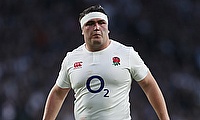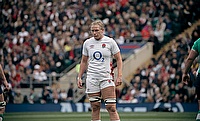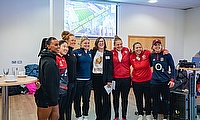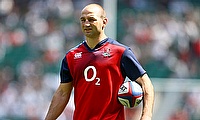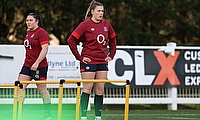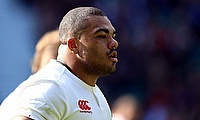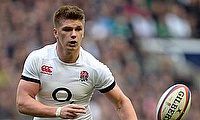England's winter of discontent takes root

England have points to prove in the next two internationals
©PA
Over a week on from a thoroughly disenchanting loss to New Zealand at Twickenham, England found themselves in the same situation once again, underperforming and losing to one of the best sides in the world on home turf.
A 31-28 loss to South Africa hasn’t sent England to the panic stations just yet, but with the exception of the 30-3 loss to Wales last year, the mood around English rugby is as dark as it has been during the Stuart Lancaster tenure, perhaps more so given the nearness of the 2015 Rugby World Cup.
Of course, there are some mitigating circumstances for England’s form this autumn. They’ve lost an entire tight five to injury in Alex Corbisiero, Tom Youngs, Dan Cole, Joe Launchbury and Geoff Parling, but the set-piece has actually flourished, arguably functioning as well as it ever has under Lancaster. The hardest pill for England to swallow however has been the loss of Manu Tuilagi, whose devastating line breaks seem to be the only source of consistent attacking success, outside of the pack, that England have had over recent years.
It’s not actually been the losses that have England so reeling, though three-point losses to the two best sides in world rugby would be disheartening at the best of times, it’s been the subpar performances in these two games that have created a very real sense of disillusionment. It must be added, too, that neither New Zealand nor South Africa were at anywhere near their best in both of the games, yet still looked relatively comfortable in victory. It’s not much, but the fact England can play so badly and lose by just three points apiece to below average All Black and Springbok sides might be something for the England management to hang their hats on. It’s a stretch, but may yet be your best hope of holding onto anything positive until the beginning of the Six Nations.
The breakdown, long a much-talked about issue in English rugby, has been a major worry this autumn. England were competitive, yet ultimately outplayed by New Zealand in this area, but South Africa went to town at the contact area on Saturday, not giving England a sniff. The likes of Chris Robshaw and Tom Wood couldn’t move Schalk Burger an inch whilst trying to secure their own ball and offered up very little in terms of disrupting opposition ball, let alone trying to turn the Boks over.
Calls to shake up the England back row had quietened of late, but there can be little doubt that the presence of Steffon Armitage and James Haskell would have made for a much more compelling contest. Armitage is one of the best fetchers currently playing the game and almost certainly the best the northern hemisphere has to offer, whilst Haskell brings ferocity and physicality to the contact area than neither Wood nor Robshaw can match.
Move away from the pack and England’s issues grow. The RFU may want to think about installing a giant compass alongside the Twickenham scoreboards for all the direction that the half-back pairing of Danny Care and Owen Farrell have shown in their two matches of the autumn so far. Admittedly, Farrell is recently recovered from an injury and looking for both form and fitness, but Care’s kicking from hand saw England give away possession and territory repeatedly, far too cheaply on almost all occasions.
They may play in different positions, but England’s half-backs would do well to watch over Willie le Roux’s game at Twickenham on Saturday. The Springbok full-back was exceptional with his kicking form hand, always giving his team an opportunity to win the ball back or, if looking to pin England back deep in their own half, putting in raking kicks for touch, weighted excellently, just behind England’s advancing wings.
Further out, England’s midfield has got very little going in either game, whilst the wingers, aside from a Johnny May try and a couple of Anthony Watson breaks, have been stood twiddling their thumbs near the sidelines. Obviously the relationship between the midfield and the half-backs is symbiotic, if one struggles, the other usually will as well, but you would still expect to see more, even from an England side bereft of Tuilagi.
Given the alarming regularity with which Tuilagi seems to be injured these days, finding an effective combination without him is paramount to any hopes England have at the RWC. If Tuilagi is healthy come England’s opener with Fiji next year, fantastic, but if not, they need to be prepared. All they seem to have discovered so far this autumn is that Kyle Eastmond and Brad Barritt are almost certainly not the combination to do that.
Cue national unrest at England’s performances this autumn and even some murmurings that Lancaster is not the right man for the job. The stats wouldn’t necessarily disagree, as the losses to New Zealand and South Africa have seen Lancaster’s win percentage slip to 56%, a number that is in the same ballpark as the ones that saw both Martin Johnson and Brian Ashton get their marching orders. The fact that England’s play has seemingly regressed in all areas other than the set-piece this autumn, also adds fuel to the fire. In fact, the 2012 win over New Zealand has certainly put a gloss on Lancaster’s tenure that belies the fact he has yet to win a Six Nations title and has just a solitary Triple Crown to his name.
However, common sense dictates Lancaster is the right man to take England through to the 2015 RWC and barring any Tiger Woods-esque falls from grace, should also be the man to take them through to the 2019 RWC. The importance of the culture that Lancaster has instilled should not be underestimated, nor should his experience with younger players, especially when you consider England have the best part of two Junior World Championship-winning sides still to incorporate into their senior set-up. Amongst his support staff, Graham Rowntree is sitting pretty, having established himself as arguably the world’s premiere scrum coach, whilst Andy Farrell has overseen and developed a usually very impressive and effective England defence.
Mike Catt’s job security however, despite signing a new contract, looks less secure, with England displaying all the attacking incision and threat of a plastic hammer this autumn. Catt will almost certainly see England through to the RWC, but if there’s little or no improvement to England’s attacking game in that time, he could find himself looking for work after the tournament, with Alex King and Nick Walshe worth keeping an eye on if that scenario does play out.
Calls for Lancaster’s head are obviously premature, but there’s no doubt he, and the England team, are under real pressure to deliver in their remaining two QBE Internationals. Samoa are up first, giving Lancaster an eagerly-anticipated opportunity to play some fresh faces, as well as allowing him to give some of his underperforming stars a week away from the limelight. All eyes will then turn to Australia, undoubtedly the most important game of Lancaster’s entire tenure to this point.
Not only do England need to record an emphatic win over their antipodean rivals to salvage what has already been decided as a poor autumn series for the Red Rose, but also to ensure they have the upper hand mentally ahead of meeting in their RWC pool next year. Wholesale changes are rarely useful in rugby, but with the back row, half-backs, midfield and full-back all underperforming at this juncture, it’s approaching the point where we might see that, especially if some of the back-up players make a big enough impression against Samoa.
Lancaster needs to look to the likes of Haskell, Ben Morgan, Luther Burrell and Ben Youngs to help resurrect England, whilst the time is nigh to swallow pride and send for Armitage. England have a good team that in the long-term they need only to tweak, not disband, but if ever a compelling case was made to pick a team purely on form, it would be against Australia.
If England lose to the Wallabies later this month, the ensuing maelstrom and panic will be colossal. Calls for on and off-field changes will transform from murmurings to full-blown demands, creating a winter so full of discontent, there will be little the season of goodwill can do to change that.
The best coaches are often forged in times of great adversity; it’s time for Lancaster to show he belongs in that category.


